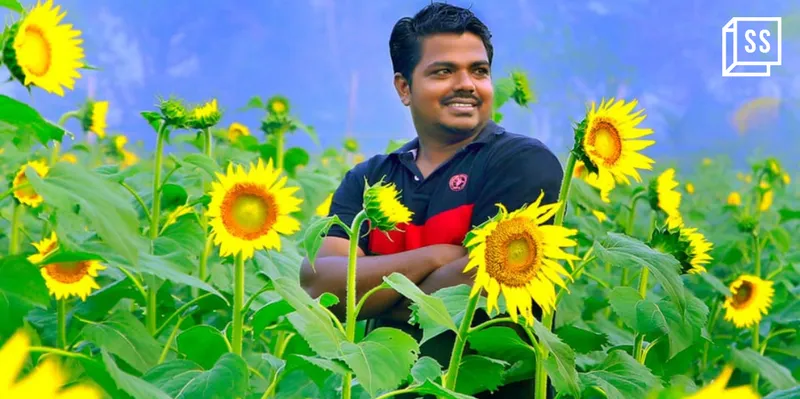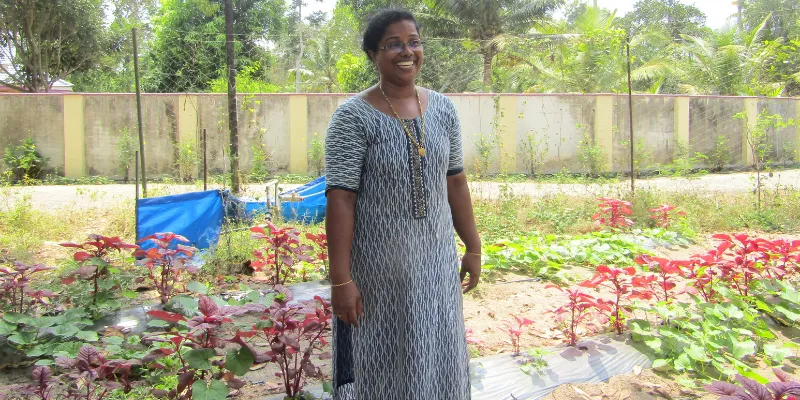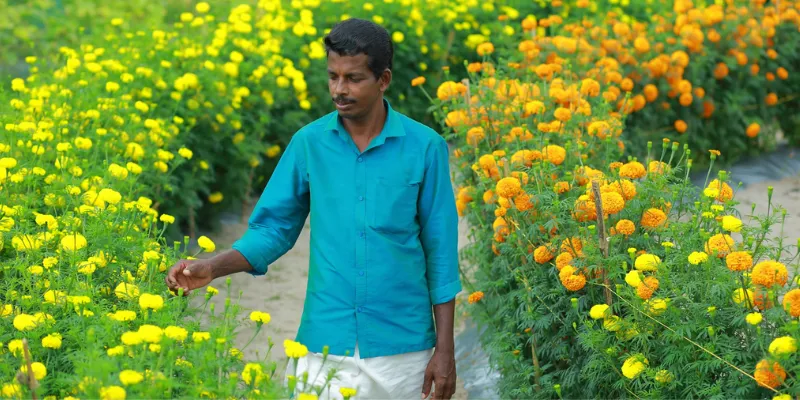In Kerala’s Kanjikuzhy panchayat, villagers are harvesting the benefits of organic farming
Around 90% of the population of Kanjikuzhy panchayat in Kerala’s Alappuzha district engages in “good agricultural practices” and is well-known for its organic produce. SocialStory visits Kanjikuzhy to see how farmers are sowing the seeds of their own green revolution.
Key Takeaways
- Around 90% of Kanjikuzhy's population engages in organic farming.
- Sujith SP, a farmer from the village visited Israel recently to learn about farming methods.
- Asha Shaiju won the State Government's best woman farmer award.
An hour away from the bustle of Kochi city, along the NH 66 bypass, lies Kanjikuzhy panchayat in Kerala’s Alappuzha district. The panchayat houses a population of around 32,000, of which a whopping 90% is involved in organic farming.
Sujith SP has recently returned from an agricultural study tour to Israel organised by the Government of Kerala for a select group of farmers from the state. Sujith, who goes by his YouTube moniker, Variety Farmer is well-known as a young farmer who is not afraid to experiment. He’s also quite the online star–with his reels and videos garnering millions of views.

Sujith SP converted 2.5 acres of paddy land to cultivate sunflowers
In Israel, he visited community farms or kibbutz, and saw first-hand how the farm-to-table concept works with a high yield that is sold through each farm’s own outlet.
“We understood how technology can benefit farmers and increase crop productivity. I am hoping to put into practice what I learned from the Israeli farmers,” he tells SocialStory.
Sujith, an organic farmer for 12 years, shot to fame after he chose to share videos about fruits and vegetable cultivation.
In 2021, he converted 2.5 acres of paddy land to cultivate sunflowers. This became a major tourist attraction drawing people to the village in hordes.
Like other farmers in the panchayat, Sujith has taken land (around 20 acres) on lease and grows vegetables like okra, long beans, bitter gourd, and snake gourd. His experiments with winter vegetables like broccoli, cauliflower, and cabbage have also borne fruit.
Good agricultural practices
Most of the produce in Kanjikuzhy was grown on extremely dry land, which is considered unfit for farming until a group of resilient farmers decided in the mid-90s to take the challenge head-on and pursue organic farming.
Gandhi Smaraka Seva Kendram, a non-profit organisation in Cherthala has been at the forefront to introduce best agricultural practices in the Alappuzha district (that Kanjikuzhy is part of), apart from other allied activities for economic and social upliftment of the villages in the area.
In the last 14 years, the organisation, through several projects, has ensured self-sufficiency in rice production, milk, fish, and vegetables.
Manu PS, programme officer at the NGO, says people in the district were initially hesitant to take up organic farming.
“Initially, through a National Agricultural Bank for Rural Development (NABARD) project, we selected 500 farmers to raise awareness on farming without chemical pesticides. We also selected a few of them to create model farms so that others could see the processes involved and the benefits,” he says.
The NGO also set up a bio-lab within its premises to produce biopesticides that include friendly fungi like Trichoderma and friendly bacteria like Pseudomonas that would aid farmers, without resorting to chemical fertilisers. They also taught them to make natural manure from vegetable and fish waste–all suited for organic cultivation.
However, Manu points out that getting an organic certificate is both cumbersome and expensive. Instead, one could use “produced through good agricultural practices” to sell the produce.
The organisation also put into practice Zero Budget Natural Farming (ZBNF) as envisaged by agriculturalist Subhash Palekar. Promoted as an alternative to the Green Revolution’s methods of using chemical pesticides and intensive irrigation, ZBNF raises crops without the use of fertilisers or pesticides, or other external materials. In essence, it helps farmers adopt sustainable practices that help soil fertility and ensures zero cost of production.
Manu explains, “We again selected 1,000 farmers and took them to Nemmara in Palakkad district to introduce them to ZBNF. We have also formed a farmers’ collective for this,” he adds.
Everyone must try farming

Asha Shaiju is an award-winning farmer from Kanjikuzhy
Asha Shaiju, an award-winning farmer from Kanjikuzhy, is all praise for the Krishi Bhavan and Panchayat officials.
“Apart from the distribution of seeds and saplings, we also have an uninterrupted supply of labour thanks to the Haritha Karma Sena. This ensures work is done in an efficient manner, especially during sowing and harvesting,” she says.
Shaiju started organic farming with a small kitchen garden after she moved to Kanjikuzhy 11 years ago, encouraged by the Haritha Samrudhi Project of Haritha Keralam (A Green Kerala). She cultivates vegetables in different patches of land, totaling 7.5 acres, in which she grows long beans, yellow cucumber, spinach, melons, ridge gourd, and bitter gourd. She shows us magazines in which her experiments with broccoli and cauliflower were featured last year.
She points out the okra is ready for harvesting in a patch of land nearby and she got around 12 kg that day. Shaiju believes picking up organic farming is not difficult and advises everyone to try growing their own fruits and vegetables.
Shaiju won the Kerala State Best Woman Farmer Award, and is happy that her efforts as a woman farmer have been recognised. “I can assure you a 100% that all produce is organic and cultivated with organic manure,” she adds.
Geetha Karthikeyan, President of Kanjikuzhy Panchayat says the success of its initiative stems from collaborations between different organisations like the Krishi Bhava, Kudumbasree and Ayalkootam.
“We ensure seeds and organic compost are supplied regularly, and a cooperative cluster helps in the sale of vegetables. Now is the time for the harvest of the Vishu kani vellari (a cucumber that is used during the festival of Vishu—or the New Year’s Day in Kerala which falls in mid-April) and though water supply was a problem, we made sure solutions were at hand to help the farmers,” she says.
The long and short of it

Subhakesan has been an organic farmer for 40 years
Subhakesan, who’s been an organic farmer for 40 years became famous for growing what came to be known as the Kanjikuzhy payar (long beans or cowpea beans), a hybrid of lima and its local variation, which reaches 37 inches in length.
“I started organic farming from the age of 10 in my own home and there’s been no looking back,” he says.
For many years, Subhakesan only cultivated for seeds but now he grows a variety of vegetables in different patches of land, around 25 acres. The recipient of many awards such as the Haritha Mithra Award, Akshaya Kriya Award, the Governor’s Award and many more, he credits former Kerala’s former Finance Minister Thomas Isaac for his support to farmers in the region.
Standing under a small patch of shade in a corner of farmland where he recently concluded an exhibition of 25 varieties of vegetables, he points out how barren land could be turned into a veritable green grove. There are different varieties of chilies in grow bags, snake gourds and bitter gourds hang from overhead vines and the vellari (cucumber) flowers have bloomed, hopefully in time for a Vishu harvest.
“With support from Krishi Bhavan and government agencies, we were able to cultivate a variety of vegetables on this land,” he says.
Subhakesan even gave up a plum government posting in the Kerala State Electricity Board (KSEB) to continue with organic farming.
Not far from Subhakesan’s farm, Jyothish greets us on a patch of land that he has leased to grow vegetables. There are rows of Malabar spinach, cucumber plants, and right in the front, huge sunflowers staring at the midday sun.
Unlike the others, there’s a touch of cynicism in his voice.
“I started farming in 2017 and now cultivate vegetables in 20 acres of land and keep poultry like cows and hens. I feel we don’t get the price we deserve for our efforts,” he says.
He also believes that some people term their produce organic but in secret use pesticides. The conversation is interrupted by another farmer who presents Jyothish with the first watermelon from his farm. Soon, his family member presents us with tall glasses of watermelon juice, with chunks of the fruit to scoop up. It is delicious.
“This is how organic produce should be, grown without any trace of chemicals, in any part of the process,” he points out.
Channeling profits
Most of the farmers sell their produce in small shops outside their farms.
Shaiju says, “I sell my vegetables to the shops that dot the highway. I also have regular customers who come home and buy in bulk. Cancer patients who must follow specific diets also come to me for organic vegetables,” she says.
There is a difference of almost Rs 20 between organic vegetables and those grown with the help of chemicals. Mostly, prices follow a regular pattern and do not see huge fluctuations.
“Those who are aware of the difference it brings to their lives, choose organic. I can proudly say that there is profitability in organic farming,” says Subhakesan. He sells vegetables worth one lakh and more in a week and makes a profit of around 50%. He also spent Rs 7 lakh a year on labour, ensuring employment for many.
These good farming practices held the farmers in good stead during the pandemic. Shaiju’s husband’s event management business came to a standstill, and he joined his wife full-time.
While Panchayat president Karthikeyan suggests the introduction of a PDS-like channel for organic vegetables, the farmers believe the demand far outstrips the supply.
“We cannot tie up with supermarkets like Lulu as they would demand a continuous supply and a certain quantity of produce, which would be difficult to manage,” says Subhakesan.
Jyothish admits being on YouTube like Sujith will help spread the word and help farmers in the long run.
There are some challenges that keep the farmers up and awake all night. Shaiju speaks of a constant snail infestation that destroys plants. Also, labour costs can be high, going up to Rs 1,000 a day.
“It’s a lot of hard work, but my greatest joy is seeing my daughter walking through the farm, picking up a vegetable and eating it raw without even washing it,” Shaiju says.
Edited by Affirunisa Kankudti







